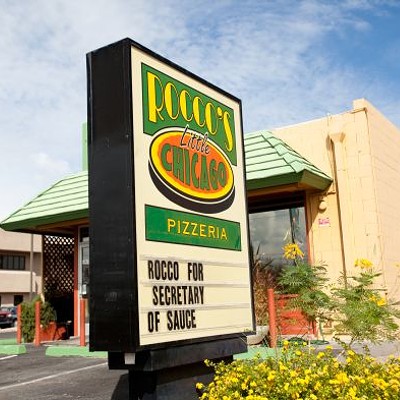Problem is, guys like Leroy Smith just can't keep their mouths shut. And anyone with a loved one stuck behind bars--or working at a prison--ought to be damn glad about that.
Smith's story begins in 2000, when he was appointed safety manager for the United States Penitentiary-Atwater, in Merced, Calif. Soon, he began noting shoddy protections for inmates and guards in the prison's computer-recycling program.
This computer enterprise is administered by a branch of the BOP called Federal Prison Industries. In turn, the program's business contracts are handled by a government-owned corporation called Unicor. Customers have included state and local agencies--including the University of Arizona--and huge corporations such as Dell Inc.
Under these outside contracts, Unicor uses about 1,000 hammer-wielding prisoners to dismantle used computers, a process which releases dangerous metals including beryllium, lead, cadmium and barium. Exposure to these toxins can cause nervous-system damage, and prostate or lung cancer. Nor are the amounts insubstantial; a single television or computer monitor contains up to four pounds of lead.
By contrast, modern recycling systems use automated crushers and sophisticated environmental controls. So long as prisons avoid investing in this equipment--and cling to their primitive processes--inmates and guards will likely continue facing unacceptable health risks.
Nor are such perils limited to Atwater; similar recycling programs are clanging away in prisons from Elkton, Ohio, and Texarkana, Texas, to right here in Tucson.
Powerful, prolific and well-entrenched, this operation easily brushed aside Smith's requests to make it safer. In turn, the dogged safety manager turned up the heat, raising his worries through countless meetings and unending memos.
Not surprisingly, his steady drumbeat wasn't exactly well-received by higher-ups. For his trouble, he was ignored, harassed and threatened. His family life tensed, and his health took a dive.
Jeff Ruch is executive director of Public Employees for Environmental Responsibility, based in Washington, D.C. He's not surprised by the harassment. "Leroy Smith has exposed a rotten little corner of the prison-industry world," Ruch says. "And we're appalled that the prison system has treated its own staff members and inmates in their custody so recklessly."
Smith calls it his professional responsibility to point out safety violations--regardless of the cost. "I'm a fighter," he says, "and I knew it was the right thing to do.
In truth, he couldn't do otherwise. "Over the last couple of years," he says, inmates and staff "have told me they have deterioration of the joints, liver damage, kidney damage, respiratory damage, lesions on their bodies."
As pressure grew, the Bureau of Prisons was eventually compelled to investigate itself. Few were shocked, however, when that review soft-pedaled any safety problems.
This deadlock was finally broken when Smith's allegations reached the Office of Special Counsel, an agency that scrutinizes whistleblowers' complaints. That was a very big deal: Special Counsel Scott Bloch is a presidential appointee, and his reports travel straight to the Oval Office.
On April 3, he issued a blistering appraisal that cited Smith by name and confirmed his claims. "Dear Mr. President," Bloch wrote, "Despite a stated policy of 'provid[ing] a safe and healthful environment for all employees and inmates,' the Federal Bureau of Prisons (BOP) and Federal Prison Industries Inc. (FPI) managers recklessly, and in some cases knowingly, exposed inmates and staff to unsafe levels of lead, cadmium and other hazardous materials over a period of years ... ."
Smith has since transferred to Tucson. And he says the special counsel's report "does make me feel vindicated in a lot of ways. But there's also a long struggle out there to ensure the necessary health and inmates that are sick."
That's going to be a lengthy tussle, if Bureau spokeswoman Traci Billingsley lends any clue. "The BOP strongly disagrees with OSC's report," she writes in an e-mail to the Tucson Weekly.
Her agency has tightened its regulations, she continues, following an "extensive investigation" into Smith's charges. As a result, "we are confident that every one of our computer-recycling factories is currently in full and complete compliance with applicable laws and regulations."
But according to Special Counsel Bloch, the Bureau of Prisons routinely contradicted well-documented evidence from the Atwater prison. And he described the Bureau's investigation of other recycling facilities "to have been cursory at best."
Jeff Ruch calls Bloch's report unequivocal: "The special counsel looked at what Leroy Smith was saying and found it was far more credible than what the prison system was saying."
PEER is now calling for an investigation by the U.S. Justice Department, which oversees the Bureau of Prisons. Ironically--or perhaps disingenuously--prison officials are echoing that request. "The Bureau of Prison welcomes the opportunity to have any independent body conduct a review of any and all of our recycling activities," Billingsley writes.
Still, prospects for such a probe aren't encouraging; when the Tucson Weekly phoned the Justice Department for comment, spokesman Arthur Schwartz told us requests should come by e-mail, "otherwise, they just get bounced around here and go nowhere."
After our subsequent e-mail went unanswered for several days, we again called Schwartz, who then directed us to the Justice Department's inspector general. But when we contacted that office late last Thursday, no one was available to field our questions.
Friday would be no better, we were told, since everyone available to talk was taking the day off.












